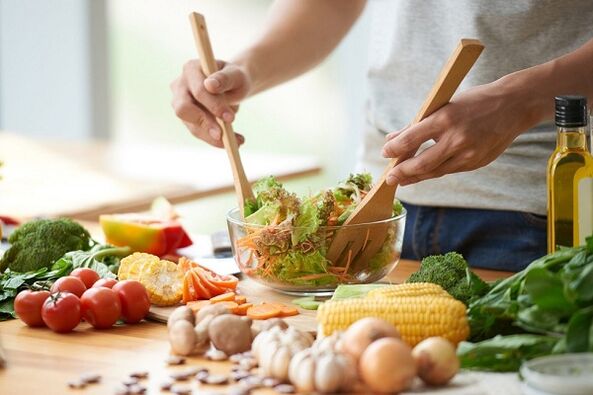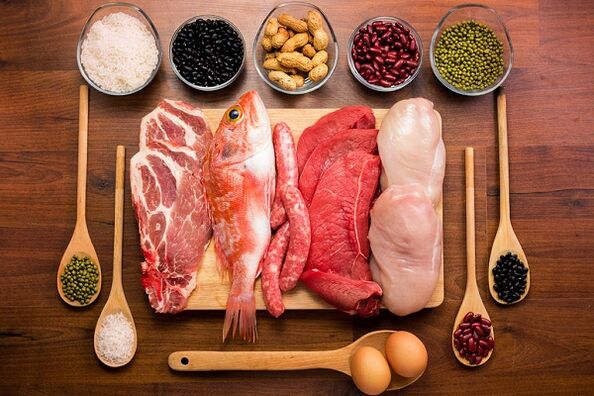Adequate nutrition for various diseases is a significant component of a speedy recovery. A diet for prostatitis and prostate adenoma improves the condition of the body, helps to combat a number of unpleasant symptoms in men. Conversely, dietary errors can aggravate unpleasant symptoms and increase the discomfort caused by prostate disease.
Nutritional characteristics for prostatitis
Main effects of adequate nutrition on inflammation of the prostate:
- Prevents irritation of Organs pelvic organs, which can aggravate inflammation.
- Strengthening the functionality of the immune system.
- Normalization of the digestive tract.
- Decreased urge to urinate, especially at night.
- Prevention of hardening of the prostate, restoring blood flow and providing nutrients to the organ.

The therapeutic diet involves:
- Enriching the diet with healthy products.
- Establish a drink regime (at least 2-2, 5 liters of filtered water per day).
- Combination of "healthy" eating with physical activity (for example, physical education).
- Compilation of separate menus for the "exacerbation" and "remission" phases.
- Total rejection of bad habits.
Useful products
Proper nutrition for prostatitis in men consists of consuming foods that help speed healing. Detailed recommendations are provided by a medical specialist.
The following should be added to the diet:
- Nuts of all varieties.
- Various nuts.
- Lean meat.
- Parsley and other fresh herbs.
- Red fish.
- Vegetables.
- Vegetable fats.
- Non-acidic fruits.
- Gray bread.
- Buckwheat / oats.
- Fermented milk, kefir and cottage cheese.
- Fruit compotes.
- Honey.
- Natural juices (in particular, asparagus).
- Parsnip.
When forming a daily diet menu, it is necessary to pay attention to the amount of fiber consumed. It is important for normal bowel movements (excretion of feces from the digestive tract by the body). You should also eat foods enriched with zinc. The trace element increases resistance to infection and improves (as well as quantity) semen quality.
In case of a stable reference, the following is allowed:
- Mushrooms.
- Spices.
- Some fried food.
- Dry wine (1-2 times a month 100 ml).
Contraindications for food
When diagnosed with prostatitis, the following is prohibited for men:
- "Fatty" foods - increases cholesterol levels, promotes the formation of plaque on the walls of blood vessels. Regular "greasy" nutrition leads to impaired blood circulation, complicating the course of the disease.
- Alcohol (even beer) - negatively affects blood flow and the health of men in general. It leads to the appearance of congestion in the small pelvis, reduces immunity, interrupts the production of hormones and prostatic secretions and disrupts erectile function.
- Strong coffee - negatively affects the vascular system, increases pressure in the prostate and promotes the spread of infections (with bacterial or viral etiology of inflammation) throughout the body.
The following products are also contraindicated:
- Fast food.
- Rich soups.
- By-products.
- Mushrooms.
- Peppers, garlic and onions.
- Pickles.
- Spicy food.
- Smoked products.
- Fatty pork and lamb.
- Cooking.
- Acidic fruits.
- Food containing chemical additives.
- Carbonated drinks.
- Spices.
- Sweets.
Diet for prostatitis in men: menu for a week
Changes in diet depending on the stage of prostatitis. Nutrition for chronic prostatitis can be more varied. An example of a weekly menu for men in remission is shown in the table.
| Breakfast | Lunch | ||
| Monday | Cabbage and carrot salad; Oatmeal porridge; Fruit juice. |
Vegetable soup; Meat cooked with vegetable stew; Some fruits. |
Curd soufflé; Fresh apple juice. |
| Tuesday | Cucumber and vegetable salad; Millet porridge; Cherry compote. |
Shrimp and vegetable soup; Steamed chop with mashed potatoes; Tea with honey. |
Fried; Red fruit salad with sour cream. |
| Wednesday | Buckwheat; Cucumbers and tomatoes; Morse. |
Borscht in vegetable broth; Boiled chest; Garlic salad; Green tea. |
Carrot cake; Spoon of sour cream; Fruit kissel. |
| Thursday | Vinaigrette; Pumpkin seed and dried apricot cake; Decoction of herbs. |
Fresh cabbage soup; Cooked rabbit with vegetable garnish; Sweet Orange. |
Steamed fish; Celery stew; Apple's Jam. |
| Friday | Milk soup; Dry bread with cheese; Mint tea. |
Chicken soup; Veal stew with roasted potatoes; Tomatoes. |
Pancake with red fruits; 2 tablespoons of low-fat cottage cheese. |
| Saturday | Corn porridge with dried apricots; Boiled egg; Fresh orange juice. |
Turkey soup with vegetables; Steam meatballs; Compote of dried fruits. |
Potato casserole; Lettuce leaves with olive oil. |
| Sunday | Baked potatoes; Salad with peeled pumpkin seeds; Decoction of herbs. |
Cheese soup; Steamed fish with buckwheat; Green or white tea. |
Vegetable chops; Red fruit juice. |
In the context of an exacerbation, nutrition should be light and smooth. Nutritionists advise the following option:
- Breakfast. Buckwheat porridge "smear", fruit jelly;
- Lunch. Cabbage soup, boiled fish, beet salad, unsweetened tea;
- Dinner. Steamed chicken meatballs with cooked vegetables and jam;
- At night. A small serving of homemade yogurt.
The following menu will also work:
- Breakfast. Oatmeal with a little honey, cherry jam;
- Lunch. Liquid tomato soup, light vegetable salad, a slice of whole grain bread with low-fat cheese, green tea;
- Dinner. Zucchini cooked with eggs, a slice of cooked, fresh fish;
- Before going to sleep. Strawberry juice.
The following diet is suitable for antibiotic therapy:
- Good morning. Cottage cheese casserole with berries, herbal tea;
- Day. Carrot salad, chicken soup, rabbit cooked with vegetables;
- Night. Cooked vegetables, bananas and apples;
- At night. A glass of yogurt.
How to eat properly for BPH?
Benign prostatic hyperplasia (BPH) is expressed in the proliferation of organ tissues. After confirming the diagnosis, the doctor, in addition to drug therapy, prescribes a specialized diet. For BPH, the diet is based on several principles:
- Lack of hunger combined with weight correction;
- In case of obesity, foods are selected in order to guarantee weight loss;
- A varied menu, dishes containing the necessary microelements and vitamins;
- Dividing the daily food intake into 4-5 meals;
- Avoid eating before bed.
The main focus is on products that help to reduce benign tumors. Any food that increases the load on the bladder and causes (even if indirectly) inflammatory processes is excluded.

Eating disorder in BPH affects men:
- Constipation or diarrhea.
- Irritation of the bladder.
- Increased risk of stagnation of secretions and blood in the prostate.
Sometimes, men diagnosed with prostate adenoma switch to sports nutrition, considering it to be the most balanced. It is important to understand that it was developed for healthy people (and that, in addition to the main food) and is not intended for use in the presence of pathological processes in the body.
Nutritional guidelines for BPH:
- Food should be eaten at approximately the same time.
- Feelings of overeating should not be allowed.
- The diet is calculated for each individual man.
- The main focus is on foods containing fiber and zinc.
- Elimination of foods that negatively affect the immune system.
- The diet varies depending on whether you are on medication or surgery.
Foods that are useful for BPH are included in the diet:
- Vegetable fats.
- Dietary meat.
- Raw or cooked fruits and vegetables. It is especially important to add cucumbers, pears, kiwi, potatoes, watermelons, bananas and dates to the diet.
- Fermented dairy products.
- Pomegranate, carrot, beet, cranberry and tomato juice.
- Mussels, fish, seaweed.
As with prostatitis, drinking is important. You need to drink about 2. 5 liters of water a day.
Experts advise to refuse:
- Fast food.
- Processed and smoked cheeses.
- Milk.
- Store juices and sugary drinks.
- Chilli pepper.
- Garlic.
- Sweets.
What do male critics say?
On the Internet, you can find comments from men talking about their own experiences with prostatitis and BPH. Along with information about medications, patients also share the results of the diet in their assessments.
“I have had prostatitis for over 5 years. During that time, I didn't try anything. And I went to the doctor, and I was self-medicating, it didn't make sense. As for me, I observed that, while maintaining the correct lifestyle (I am talking about nutrition now), relapses occur much less frequently and are not as "bright" manifested. The most important thing is to exclude alcohol and, if possible, not to smoke and, as usual, remove fried, salty and spicy foods. "
“Six months ago, I started having terrible urination problems. I went to the doctor, he said that I have prostatitis. First, he warned me that treatment and recovery depend on how I eat and how active I am. There was no trace of inflammation of the prostate. I am sure that the diet has largely contributed to the effectiveness of the treatment ”.
“The prostate adenoma came unnoticed. The doctor said that surgery is not recommended at my age (in addition, I have heart problems). He prescribed medications, advised him to walk more outdoors and adjust his diet, noted what you can eat and what you can't. He strictly banned alcohol consumption. I feel really good, I even got an erection. The mood improved, I wanted to live with renewed vigor ”.
























